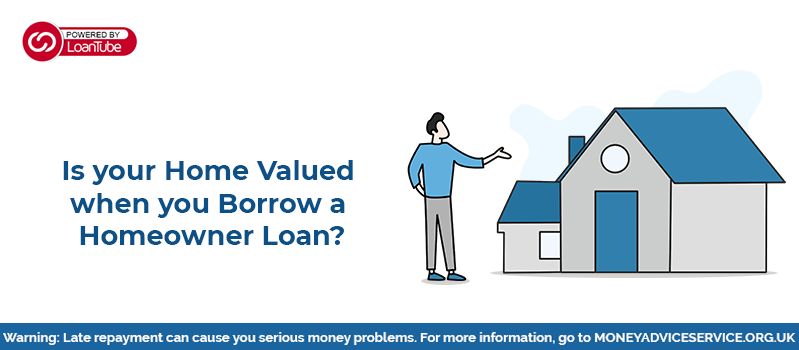Big-ticket expenses such as a home refurbishment project or purchasing a car may cost you a fortune. Using your savings to fund such purchases or projects isn’t the wisest financial decision. A typical loan may help you get through a cash crunch but cannot cover a high-value expense. If you’re looking to borrow a large amount of money, having a property can help you leverage the situation. Homeowner loans can help you get financial aid against your property.
But do you have to get your home values before taking out a homeowner loan? Read on to find out.
What is a homeowner loan?
A homeowner loan is a personal loan that property owners can borrow. Homeowner loans can be both secured and unsecured. Unsecured homeowner loans are essentially no guarantor loans, wherein you don’t need collateral security.
Secured homeowner loans, on the other hand, can be borrowed against the actual value of your property. Herein, you use your share in the property as collateral against the loan. These loans allows you to borrow a considerably larger sum of money at a lower interest rate. However, there are a set of risks associated with this type of credit. When you declare your share in the property as collateral, you are risking the possession of your home. If you happen to default, the lender can seize and repossess your house to recover their loss.
To be eligible for this loan, you must be a homeowner or hold equity in your property. Home equity is the value of your share in the mortgaged property. Mathematically, home equity is the difference between the market value of your property and the amount you owe in the mortgage. Take a look at the example below:
Say you’ve recently invested in a property worth £200,000, wherein you’ve paid 30% (£60000) in down payment. Now, you mortgage the property to pay the remaining £140,000. So, your equity in the property is £60,000.
How much will a homeowner loan allow me to borrow?
How much you can borrow with a homeowner loan largely depends upon:
- The market value of your home
- Your creditworthiness
- Your affordability
- The loan term
- Your age
Will I have to get my home valued before getting a homeowner loan?
The simple answer is yes. You’ll need an accurate valuation of your home to calculate the Loan-to-Value (LTV). LTV is the ratio of the mortgage you require for a property to the value of the property.
For instance, if you want to buy a property worth £200,000 and have equity of £90,000, you’ll need a mortgage to cover £110,000. To calculate your LTV, divide the mortgage by the property’s value. In this case, the LTV will be 55%.
If you have an existing mortgage, you’ll have to subtract the outstanding balance from this mortgage to obtain the LTV. So if your property is worth £200,000 and your mortgage balance is £30,000, then the value becomes £170,000. Now, if you want to borrow £110,000, the LTV will be 64.70%.
Most lenders have a standard criterion concerning the maximum LTV. Lenders generally decide the loan amount based on the value of your property. But a lower LTV can help you snag better interest rates on homeowner loans.
How much will a homeowner loan cost me?
You can calculate the cost of a homeowner loan by adding the interest rate and any additional fee to the principal. The factors below contribute to the overall cost of your loan:
Interest: The monthly instalments of your loan includes the interest rate charged. The length of the loan term affects how much you pay towards interest. A longer tenure can certainly reduce your monthly instalments, but you will end up paying more in interest. There are two types of interest rates that lenders charge:
- Variable: Variable interest rates can vary throughout the loan. Although, initially, they are cheaper than fixed rates loans.
- Fixed: Fixed interest rates stay constant throughout the term of your loan.
Fee: Most lenders who offer secured loans don’t impose any additional charges. However, it is wise to check for any hidden costs charged by your lender before signing the loan agreement. Here are some additional charges that your lender may levy:
- Brokerage fee
- Legal fee
- Disbursement charges
- Valuation charge
What all can I fund with a homeowner loan?
You could use a homeowner loan to serve any purpose you like. A homeowner loan can cover anything – from a home improvement project to investing in a new property. People often use homeowner loans to finance their home renovation projects.
If you’ve been piling on multiple debts and now owe a large amount of money, a homeowner loan could pull you out of debt. You can borrow a homeowner loan to consolidate your debts and organize your finances. Plus, homeowner loans come at comparatively lower interest rates, which might save you some money. Although, you must consider the risk that this loan can pose to your property.
How to successfully apply for a homeowner loan
Here are some tips to help you apply for a homeowner loan:
- Work out an amount that you need and can afford to borrow.
- Calculate the LTV using an accurate valuation of your property.
- Choose a reasonable loan term, keeping your affordability in mind.
- Plan your monthly repayments well in advance.
Carefully check your credit report and get the discrepancies (if any) rectified.


